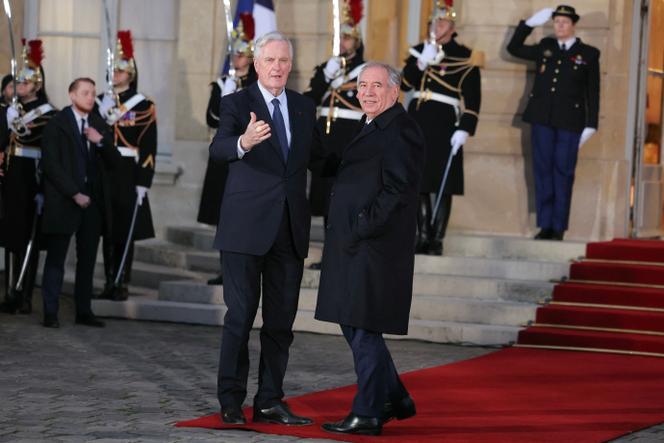French President Emmanuel Macron appointed François Bayrou as prime minister on Friday, December 13, over a week after lawmakers voted to oust conservative ex-prime minister Michel Barnier. A heavyweight politician, Bayrou heads the centrist MoDem party who has been allied to Macron since he swept to power in the 2017 election campaign.
“The President of the Republic has appointed Mr. François Bayrou as prime minister and tasked him with forming a government,” the French presidency said in a statement, giving no more details. Bayrou is the sixth prime minister under Macron.
Earlier Friday, The World learned that Macron and Bayrou had a tense meeting after the president informed Bayrou he would not be named prime minister. Bayrou threatened to leave the coalition, and the president changed his mind, deciding to appoint him after all.
Bayrou, 73, was acquitted in February after a seven-year-long case over the fraudulent employment of parliamentary assistants by his party, opening up a potential return to government. (Prosecutors appealed and a new trial is to be held, at a date yet to be decided.) In 2017, he served as Macron’s first justice minister but was replaced after just one month because of ethics concerns over the case. He has also been mayor of the southwestern city of Pau since 2014.
Bayrou now faces an immediate challenge in putting together a cabinet that can survive a no-confidence vote in a deeply divided parliament and thrash out a 2025 budget in a bid to limit economic turmoil. The new cabinet is expected to be revealed at a later date.
‘Reconciliation needed’
At the traditional handover ceremony with Barnier, Bayrou declared: “No-one knows better than me the difficulty of the situation,” with France facing a ballooning budget deficit coupled with political instability. “I am fully aware of the Himalayas that loom ahead of us,” he said of the budget deficit which is now 6.1% of GDP.
He also vowed to fight what he described as the “glass wall that has risen up between citizens and the authorities. Handing over, Barnier told his successor: “Our country is in an unprecedented and grave situation.”

Socialists quickly posed conditions for not supporting a no-confidence motion in an open letter to Bayrou. He must agree not to ram laws through without a parliamentary vote and not to rely on support from the far right, the party’s board said, adding that they would not accept ministerial posts.
Far-right leader Le Pen suggested that Bayrou’s appointment might lead to new deadlock. “We are asking him to do what his predecessor was unwilling to do: listen to the opposition and build a reasonable, well-considered budget,” she said on X.
Partner service
Learn French with Gymglish
Thanks to a daily lesson, an original story and a personalized correction, in 15 minutes per day.
Try for free
The members of Jean-Luc Mélenchon’s hard-left La France Insoumise (LFI) threatened to table a new motion of no confidence. “It’s yet another insult to democracy,” Manuel Bompard, a senior LFI lawmaker, said on X. “To topple Bayrou is to topple Macron.”
More moderate left-wingers were also unhappy. “Poor France,” Green leader Marine Tondelier said on X. She told BFMTV that her lawmakers would have “no other choice” but to vote to overthrow Bayrou’s government if it does not change its economic policy and keeps hardliner Bruno Retailleau as interior minister. Communist leader Fabien Roussel said Bayrou’s appointment was “bad news,” adding the left had demanded a “change of political direction.”
Bayrou will also have to navigate hostility from the still-influential former right-wing French president Nicolas Sarkozy. The two have a longstanding antagonism.
No majority
Bayrou becomes France’s fourth prime minister in 2024, a record since the establishment of the Fifth Republic. In January, Macron had replaced Elisabeth Borne, France’s second-ever woman prime minister, by Gabriel Attal, the youngest person to hold the position.
In June, Macron dissolved the Assemblée Nationale after the far right trounced his coalition in the June 9 European elections, and called snap parliamentary elections that yielded no majority. After a seven-week wait, Macron chose to appoint Barnier, from the right-wing Les Républicains (LR) party, in order to widen his coalition. Yet, still short of a majority, Barnier was overthrown three months later, becoming the Fifth Republic’s shortest-serving prime minister.
Macron’s search for a new prime minister was made more difficult by the complex political situation in Assemblée: It would be difficult to secure a government against potential no-confidence votes in the lower house, which is split three ways between a left-wing alliance, centrists and conservatives, and the far right.
Macron held round-table talks earlier this week with party leaders at the Elysée Palace, with the aim of finding some sort of broad alliance to form a government that could survive a no-confidence vote and pass a budget for next year. The leaders of the far-right Rassemblement National (RN) and radical-left LFI parties, who had joined forces to oust Barnier, were not invited.
Barnier’s caretaker administration, on Wednesday, reviewed a bill designed to keep the government’s lights on without a formal financial plan for 2025, allowing tax collection and borrowing to continue. Lawmakers are expected to widely support the draft “special law” when it comes before parliament on Monday.
Macron appoints centrist ally François Bayrou as France’s fourth prime minister in 2024

